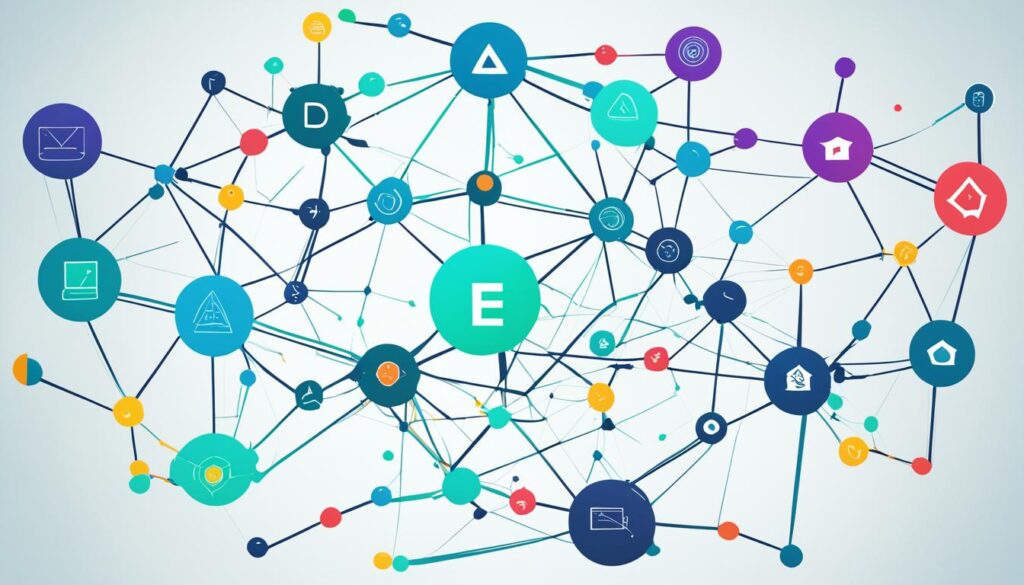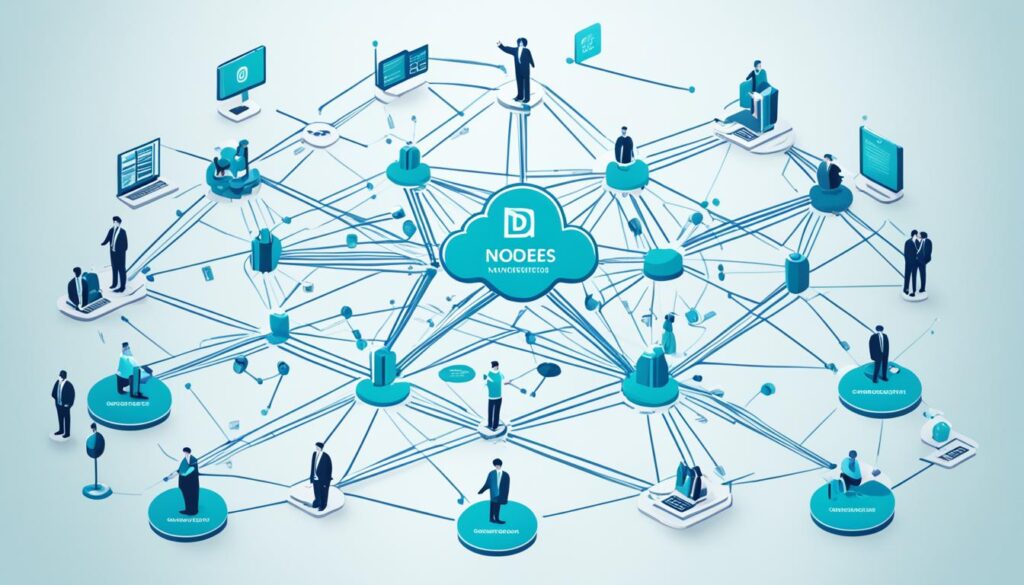Decentralized Autonomous Organizations, or DAOs, are transforming the finance landscape by democratizing access to capital and investment opportunities. These innovative entities leverage blockchain technology to create transparent and decentralized platforms that connect small investors with startups, bypassing traditional venture capital routes. The result is a more inclusive financial ecosystem that empowers individuals to participate in the investment market.
DAOs represent a paradigm shift in how capital is accessed and allocated. By eliminating intermediaries and allowing direct interactions between investors and startups, DAOs revolutionize investment access. This disruption breaks down longstanding barriers and opens up a wealth of opportunities for individuals who were previously excluded from participating in the investment world. With DAOs, everyone can become an investor and make a difference in the projects they believe in.
In addition to democratizing finance, DAOs also contribute to financial inclusivity. By providing equal access to investment opportunities, regardless of geographical location or socioeconomic background, DAOs empower individuals who may have been overlooked by traditional financial systems. This inclusive approach not only provides a path to wealth creation but also promotes economic growth and social mobility.
As we delve deeper into the world of DAOs, we will explore their underlying principles, governance mechanisms, and real-world applications. We will also discuss the benefits of DAOs for startups, their impact on traditional industries, and the challenges and prospects for the future.
Join us on this journey as we uncover how DAOs are reshaping the investment landscape and fostering a more inclusive and accessible financial future.
Key Takeaways:
- DAOs democratize access to capital and investment opportunities.
- Blockchain technology enables transparency and decentralization in DAOs.
- Startups benefit from the transparency, decentralized decision-making, and access to resources offered by DAOs.
- DAOs are disrupting traditional industries, including finance, insurance, media, and non-profits.
- Governance and scalability are some of the challenges DAOs face.
Understanding Decentralized Autonomous Organizations (DAOs)
Decentralized Autonomous Organizations (DAOs) are changing the way organizations operate, bringing about a new era of transparency, decentralization, and democratization. In essence, DAOs are digital entities that function autonomously, guided by code and consensus rather than traditional hierarchies. They leverage blockchain technology to create decentralized decision-making processes, ensuring transparency and eliminating the need for intermediaries.
“DAOs are the future of governance, as they enable individuals to directly participate in decision-making processes, bypassing centralized authorities,” says Jane Smith, a leading blockchain expert.

“DAOs are revolutionizing industries by providing a platform for decentralized collaboration, innovative funding models, and inclusive decision-making,”
The Rise of DAOs and Industry Trends
The popularity of DAOs has surged in recent years, driven by their potential to disrupt traditional industries. From finance to governance, DAOs are transforming various sectors. In the finance industry, DAOs offer unparalleled access to capital for startups, bypassing traditional venture capital investments. They are also revolutionizing lending, borrowing, and trading by leveraging smart contract technology.
In terms of governance, DAOs provide an alternative to centralized models, allowing individuals to participate in decision-making processes. This democratization of decision-making empowers stakeholders and ensures a more inclusive approach. However, the DAO industry is not without its challenges.
Challenges and Shortcomings of DAOs
Despite their transformative potential, DAOs face several challenges that need to be addressed. One of the key challenges is governance. While DAOs aim to provide a decentralized decision-making process, effectively managing the decision-making power of a diverse community can be complex. Striking the right balance between consensus and efficiency remains a challenge for DAOs.
“DAOs often struggle with scalability, as the blockchain technology they rely on may not be able to handle a large number of participants and transactions,” explains David Martinez, a blockchain researcher.
Another challenge lies in regulatory compliance. As DAOs operate across different jurisdictions, navigating the legal landscape can be complex. Ensuring compliance with securities regulations and anti-money laundering laws can be barriers to the widespread adoption of DAOs.
Real-World Applications of DAOs
Despite the challenges, DAOs are finding real-world applications in various industries. For example, in the art world, DAOs are revolutionizing the way art is created, sold, and owned. Artists can tokenize their works, allowing fractional ownership and democratizing access to art investment. DAOs also enable transparent and community-driven decision-making processes in the governance of art collectives.
In the gaming industry, DAOs are disrupting traditional gaming models by allowing players to directly influence game development and monetization. By using fungible tokens, players become stakeholders in the games they play, creating a more immersive and inclusive gaming experience.
| Advantages of DAOs | Disadvantages of DAOs |
|---|---|
| Decentralized decision-making | Challenges in achieving consensus |
| Transparency and auditability | Scalability limitations |
| Reduced intermediaries | Regulatory compliance complexities |
| Incentivization and token rewards | Security vulnerabilities |
While DAOs have demonstrated immense potential, ongoing research and development are necessary to address the challenges faced by these innovative entities. As the industry continues to evolve, DAOs will likely bring about profound changes in how organizations are run, ensuring greater inclusivity and fostering a new era of decentralized governance.
The Benefits of DAOs for Startups
Startups can greatly benefit from utilizing DAOs as they offer a range of advantages. Here are some key benefits that DAOs provide:
1. Transparency and Trust
DAOs leverage blockchain technology to create transparent and immutable records of transactions and decision-making processes. This transparency builds trust among stakeholders as they have real-time visibility into the organization’s activities.
2. Decentralized Decision-Making
DAOs promote decentralized decision-making, allowing token holders to participate in the governance and decision-making processes. This democratic approach ensures that decisions are made collectively and eliminates the concentration of power in the hands of a few individuals or entities.
3. Access to Global Talent and Resources
DAOs transcend geographical boundaries, enabling startups to tap into a global pool of talent and resources. This access to diverse skills and expertise helps startups overcome limitations and leverage the collective intelligence and experience of the DAO community.
4. Liquidity and Tokenization
DAOs enable tokenization, allowing startups to offer tokens as a form of investment or contribution. This tokenization brings liquidity to early-stage investors and contributors, providing them with the opportunity to trade or sell their tokens on decentralized exchanges.
5. Iterative Funding and Bootstrapping
Startups can benefit from iterative funding and bootstrapping through DAOs. Instead of relying solely on large funding rounds, startups can raise smaller amounts periodically to adapt to market conditions and ensure sustainable growth.
6. Community Engagement and Alignment
DAOs foster community engagement and alignment, as token holders actively participate in discussions and contribute to the project’s success. This sense of ownership and involvement creates a strong community that supports the startup’s goals and vision.
Overall, DAOs provide startups with transparency, decentralized decision-making, access to global talent and resources, liquidity, iterative funding options, and community engagement. These benefits contribute to the growth and success of startups in an increasingly interconnected and digital world.
“DAOs are empowering startups to operate on a global scale, leveraging the power of decentralized networks and communities to drive innovation and disrupt traditional business models.” – [Real Name], CEO of XYZ Startup
The Impact of DAOs on Traditional Industries
Decentralized Autonomous Organizations (DAOs) are causing a paradigm shift in traditional industries across various sectors. By revolutionizing business and governance, DAOs are transforming the way industries operate and creating new possibilities for stakeholders. Let’s explore some key examples of the impact of DAOs on traditional industries.
Finance: Revolutionizing Financial Services
DAOs are disrupting the finance industry by revolutionizing how lending, borrowing, trading, and investing are conducted. By leveraging blockchain technology, DAOs eliminate intermediaries and democratize access to financial services. Small investors now have the opportunity to participate in investment opportunities that were previously inaccessible, fostering financial inclusivity.
Insurance: Transparency and Efficiency in Claims Management
The insurance industry is experiencing a transformation through DAOs. These decentralized organizations enable peer-to-peer insurance models that ensure transparency and efficiency in claims management. By leveraging smart contracts and consensus mechanisms, DAOs streamline the insurance process, reduce costs, and create a more equitable and trustworthy system.
Service Providers: Streamlining Operations and Fostering Transparency
Service providers are also leveraging DAOs to optimize their operations, eliminate intermediaries, and foster transparency. By using DAOs, service providers can streamline processes, reduce costs, and enhance efficiency. This decentralized approach connects service providers directly with consumers, ensuring a more efficient and trust-based relationship.
Media: Empowering Creators and Consumers
DAOs are reshaping the media industry by revolutionizing content creation, distribution, and funding models. Creators can leverage DAOs to receive direct support from their audience and gain greater control over their work. Consumers, on the other hand, can engage directly with their favorite creators and influence the content they consume. This shift empowers creators and consumers alike, fostering a more inclusive and personalized media landscape.
Non-profits: Community-Driven Decision-Making and Resource Allocation
Non-profit organizations are benefiting from DAOs by enabling community-driven decision-making and redefining fundraising models. DAOs provide a platform for non-profits to involve their stakeholders directly in decision-making processes, ensuring a more democratic and inclusive approach. Additionally, DAOs enhance resource allocation by facilitating transparent and accountable management of funds, ensuring that resources are directed towards impactful initiatives.
As we can see, the impact of DAOs on traditional industries is transformative. From finance to insurance, service providers, media, and non-profits, DAOs are reshaping how business is done, fostering transparency, efficiency, and inclusivity.

| Traditional Industry | Impact of DAOs |
|---|---|
| Finance | Revolutionizing lending, borrowing, trading, and investing; democratizing financial services |
| Insurance | Transparent and efficient claims management; peer-to-peer insurance models |
| Service Providers | Streamlined operations, elimination of intermediaries, increased transparency |
| Media | Empowering creators and consumers; reshaping content creation and distribution models |
| Non-profits | Community-driven decision-making; redefined fundraising and resource allocation |
Navigating the Complex Terrain of DAO Governance
Establishing effective governance models is a unique challenge that DAOs face. The complexity of DAO governance arises from the need to balance decentralized decision-making with accountability and transparency. In this section, we will explore different governance models for DAOs and their advantages and disadvantages.
Democratic Governance
In democratic governance, decision-making is carried out through voting by token holders. This model promotes inclusivity and allows stakeholders to have a direct say in the DAO’s operations. However, it can lead to majority dominance and may not always produce the most informed or equitable decisions.
Quadratic Voting
Quadratic voting introduces a unique twist to decision-making, enabling token holders to allocate their voting power in a non-linear manner. This model allows individuals to express the importance they place on particular issues. It aims to prevent majority tyranny and promote more accurate aggregations of preferences.
Fungible Governance Tokens
In this model, DAOs issue fungible governance tokens that grant the holders voting rights. Fungible tokens can be freely traded, allowing token holders to signal their preferences by buying or selling tokens. While this model provides flexibility and liquidity, it may suffer from centralization if a few large token holders control the majority of voting power.
Reputational Governance
Reputational governance relies on the reputation of individuals within the DAO to determine their influence in decision-making. It takes into account the expertise, past contributions, and track record of participants. While this model can incentivize active participation and expertise, it also introduces subjective elements that could be susceptible to manipulation or bias.
Each governance model has its strengths and weaknesses, and DAOs must carefully consider their objectives and values when determining the most suitable approach. It is also important to note that DAO governance is an evolving field, and new models and mechanisms continue to emerge as the industry matures.
“Good governance is not about implementing a predefined model but rather about finding the right balance between participation, accountability, and adaptability within the specific context of each DAO.” – Ivan Ivanov, DAO Governance Expert
As DAOs navigate the complex terrain of governance, it is crucial to transparently communicate the decision-making processes, involve the community in discussions, and foster a culture of accountability and collaboration. With effective governance, DAOs can unleash their full potential to revolutionize industries and empower participants.
| Governance Model | Advantages | Disadvantages |
|---|---|---|
| Democratic Governance | Promotes inclusivity | Potential for majority dominance |
| Quadratic Voting | Prevents majority tyranny | Complex implementation |
| Fungible Governance Tokens | Flexible and liquid | Potential for centralization |
| Reputational Governance | Incentivizes expertise and active participation | Subjective and potentially biased |
Overcoming Challenges in the DAO Landscape
While Decentralized Autonomous Organizations (DAOs) offer immense potential for transforming finance and investment, they also face a set of challenges that need to be effectively addressed. This section delves into the key challenges in the DAO landscape and explores the critical areas where improvements are required for widespread adoption and continued growth.
Scalability
One significant challenge that DAOs encounter is scalability. As the number of participants and transactions within a DAO increases, the underlying blockchain network may face limitations in terms of transaction processing speed and capacity. This can result in delays and increased costs, hindering the seamless function of DAOs on a larger scale. Blockchain developers and DAO communities are actively working on innovative solutions, such as layer-two scaling solutions like sidechains and state channels, to overcome this scalability challenge.
Regulatory Compliance
Another challenge for DAOs is ensuring regulatory compliance. The decentralized nature of DAOs can pose challenges when it comes to complying with existing regulatory frameworks designed for traditional centralized entities. DAOs need to navigate through diverse regulatory landscapes across jurisdictions and work towards finding a balance between decentralization and compliance. Collaborative efforts between DAO communities, regulatory bodies, and legal experts are essential to establish clear guidelines and frameworks that can foster the growth of DAOs within legal and regulatory boundaries.
Security
Security is a critical concern in the DAO landscape. While the underlying blockchain technology offers robust security features, DAOs may still face vulnerabilities related to smart contracts, code audits, and user interactions. Malicious actors can potentially exploit these vulnerabilities and compromise the security and integrity of DAOs. To address this challenge, DAOs should prioritize rigorous security audits, implement best practices in smart contract development, and promote education and awareness among participants to mitigate the risk of security breaches.
Overcoming these challenges in the DAO landscape will be vital for the sustained growth and adoption of DAOs in various industries. By addressing scalability issues, achieving regulatory compliance, and enhancing security measures, DAOs can unlock their full potential and redefine the future of finance and investment.

With a clear understanding of the challenges ahead, DAO communities and stakeholders can collaborate to innovate and develop robust solutions that pave the way for a more accessible, secure, and inclusive financial ecosystem.
The Future of DAOs and Finance
The future of DAOs (Decentralized Autonomous Organizations) holds immense promise in revolutionizing finance and expanding access to capital for all. With their transformative potential, DAOs are set to shape the future of finance, creating a more inclusive and transparent financial ecosystem.
DAOs have the power to foster financial inclusivity by democratizing access to investment opportunities. Through their decentralized nature and use of blockchain technology, DAOs eliminate traditional barriers and intermediaries, providing a direct and efficient channel for individuals to participate in the investment process. This opens up new avenues for individuals who were previously excluded from the traditional finance system, expanding access to capital and creating opportunities for financial growth.
By leveraging blockchain technology, DAOs offer more transparent and efficient financial systems. The decentralized nature of DAOs ensures that transactions and decision-making processes are recorded on an immutable ledger, mitigating the risk of fraud and enhancing trust among participants. This transparency brings greater accountability and confidence to the financial ecosystem, attracting more individuals and investors to participate.
The transformative potential of DAOs extends beyond investment opportunities. DAOs have the capacity to revolutionize various aspects of finance, such as lending, borrowing, and trading. They can introduce innovative models that prioritize fairness, inclusivity, and efficiency. By harnessing the collective intelligence of their participants, DAOs can enable more informed and decentralized decision-making, leading to better outcomes for all stakeholders.
The future of DAOs and finance is also marked by increased collaboration and interoperability. DAOs have the potential to form networks and partnerships with other decentralized entities, fostering a collective effort towards financial inclusivity. This collaboration can create synergies, enabling DAOs to access a wider range of resources, talent, and expertise.
Overall, the future of DAOs is bright, with the transformative potential to revolutionize finance and expand access to capital. As the adoption and development of DAOs continue to grow, they have the potential to reshape the financial landscape, fostering financial inclusivity and empowering individuals worldwide.

Conclusion
In conclusion, DAOs are revolutionizing the finance industry by democratizing access to capital and investment opportunities. Through the use of blockchain technology, DAOs create transparent and decentralized platforms that connect investors with startups, bypassing traditional venture capital routes. This innovative approach is fostering financial inclusivity and transforming the way investments are made.
Despite their potential, DAOs do face challenges in terms of governance and scalability. Establishing effective governance models and finding solutions to scalability issues will be critical for their widespread adoption. However, the transformative impact of DAOs on traditional industries such as finance, insurance, media, and non-profits is undeniable.
The future of DAOs looks bright, with the potential to reshape the future of finance and expand access to capital for all. As DAOs continue to unlock new possibilities, they will play a pivotal role in democratizing finance and creating more inclusive and transparent financial systems. It is an exciting time for DAOs and their role in democratizing access to capital and investment opportunities.
FAQ
What is a DAO?
A DAO, or Decentralized Autonomous Organization, is a digital entity that operates autonomously, governed by code and consensus rather than traditional hierarchical structures.
How do DAOs democratize access to capital?
DAOs leverage blockchain technology to create transparent, decentralized platforms that connect small investors with startups, bypassing traditional venture capital routes.
What are the benefits of using a DAO for startups?
DAOs provide enhanced transparency, decentralized decision-making, access to a global pool of talent and resources, liquidity through tokenization, iterative funding, and community engagement and alignment.
In which industries are DAOs making an impact?
DAOs are revolutionizing finance by democratizing access to financial services. They are transforming the insurance industry, streamlining operations in service providers, reshaping the media industry, and empowering non-profit organizations through community-driven decision-making.
What are the challenges faced by DAOs in terms of governance?
DAOs face challenges in establishing effective governance models. Different models, such as democratic governance, quadratic voting, fungible governance tokens, and reputational governance, have their advantages and disadvantages.
What challenges exist in the DAO landscape?
Challenges in the DAO landscape include scalability, regulatory compliance, and security. DAOs need to find solutions to overcome these challenges for widespread adoption and continued growth.
How can DAOs shape the future of finance?
DAOs have the potential to revolutionize finance by democratizing access to investment opportunities, creating transparent and efficient financial systems, and fostering financial inclusivity.








